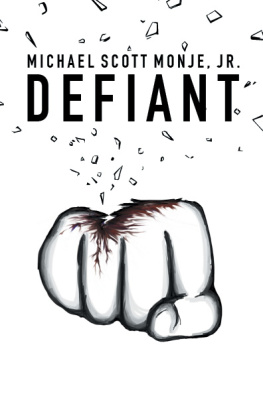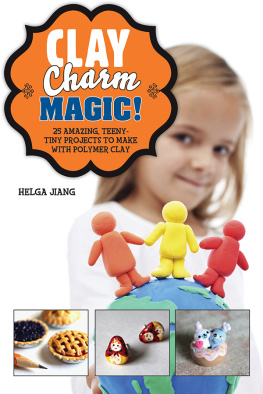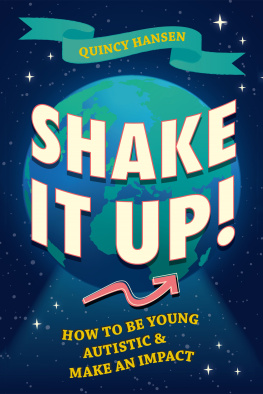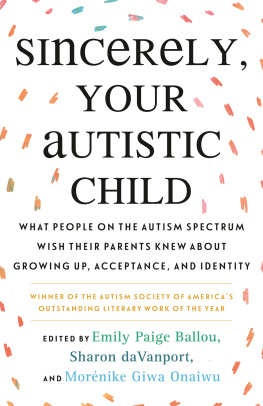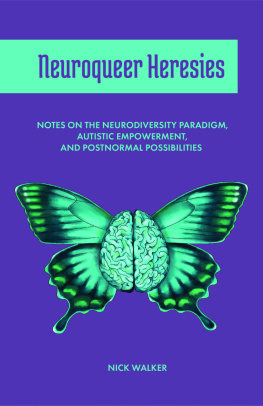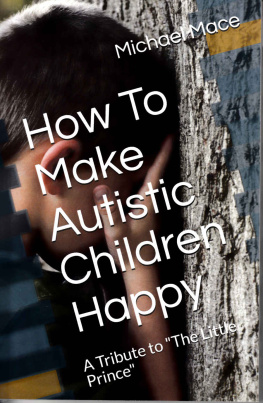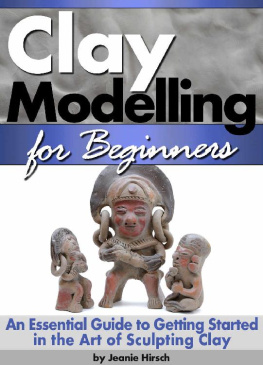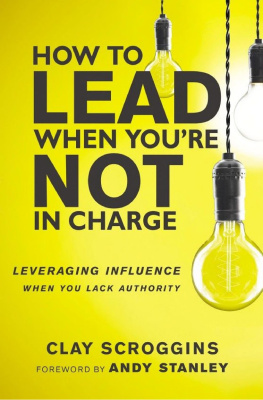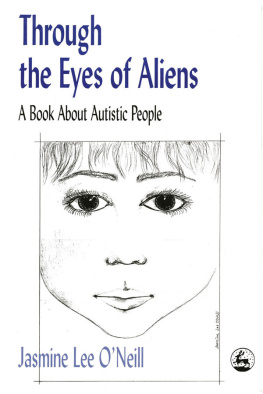Early Praise for Defiant:
Defiant is a book that will make you hurt. And it should. But it will also make you cheer for its protagonist, Clay Dillon. Clays move from compliance to defiance, from heteronormative and allistic performance to honesty and inner strength, is narrated in clear, stunning, and revelatory language.
N.I. Nicholson, author of Novena (remixed) and Editor-in-Chief of Barking Sycamores
In Defiant, Michael Scott Monje Jr. has created an authentic portrait of life as an autistic adult. The questions that Clay Dillon struggles with in the wake of his diagnosisquestions of disability, mental health and gender identitywill be familiar to autistic readers, especially those diagnosed as adults.
Michael deftly navigates Clays exploration of the shifting boundaries of disclosure and his struggles to balance his personal and professional lives, bringing both insight and unflinching honesty to the narrative. While Defiant is part of the Clay Dillon series, it works equally as well as a stand alone novel.
Cynthia Kim, author of I Think I Might Be Autistic and Nerdy, Shy, and Socially Inappopriate
For many of us a late-in-life autism diagnosis asks as many questions as it answers. Defiant takes a bare bones approach in speaking to readers from that very angle.
Monje drops us like a bomb in the thick of things and yells, Go!
Clay Dillon, a newly diagnosed adult coming to terms with what being disabled means on both personal and professional levels is such a realistic and relatable character, and Monje writes him beautifully. Im in!
S.R. Salas, author of Black and White: A Colorful Look at Life on the Autism Spectrum
Defiant
Michael Scott Monje, Jr.
Owned by disabled workers, Autonomous Press
seeks to revolutionize academic access.
Foreword by Nick Walker
Last time we met Clay Dillon, he was six years old and nothing was right.
If you havent already read Nothing Is Right , Mike Monjes first Clay Dillon novel, thats okay. Defiant takes place 23 years later, and it works more or less equally well to start with the six-year-old Clay and then read Defiant to see what the little guys future holds, or to start with the 30-year-old Clay and then go back to discover where he came from. (And even as I write these words, Monje is already well into the writing of the next Clay Dillon novel, Imaginary Friends , which takes us back again to Clays childhood, picking up not long after Nothing Is Right left off.)
Like Monje, Clay Dillon is autistic. The young Clay of Nothing Is Right didnt know he was autistic, and the adults around him didnt know it either. Defiant begins just after Clay has finally found out. At the age of 30.
Imagine spending your entire childhood, adolescence, and young adulthood knowing that youre different from everyone else in your worlddifferent from your family, your teachers, your peers, the people you pass on the street. Not different in the superficial ways that elementary school teachers and inspirational writers are talking about when they repeat cutesy platitudes about how everyone is special. Different in the fundamental workings of your mind. Different in the ways you experience, use, and understand language. Different in the ways you perceive realitynot just differences of viewpoint, but differences in basic sensory experience, differences between what you see, hear, and feel, and what everyone else claims to be seeing, hearing, and feeling. Different in ways that make understanding between yourself and the people around you impossible, because on a basic neurobiological level, theyre incapable of experiencing anything like the reality you experience, and youre incapable of experiencing anything like the reality they experience. They dont understand what your thought processes are like, or your emotions, or the reasons behind most of your actions, and you dont understand any of those things about them, either.
And imagine that because these people who are so vastly different from you also vastly outnumber you, all of the constant confusions and difficulties that stem from these differences are blamed on youattributed to some failing, deficiency, bad intent, or general wrongness on your part. Theyre different from you and youre different from them, but the way they tell the story, the way the story is taught to you, is that they are normal, and normal means good and right, and youre not normal, which means youre bad and wrong. At best, most people respond to you with puzzlement or pity; more often, with hostility, cruelty, or contempt. And no matter how hard you try to change this state of affairs (and you try harder than any of them will ever know), no matter what you do, nothing is right.
And imagine that you have no name for what it is that sets you apart from others, no name for the nature of the difference.
And then one day you find out that there is a name for it.
After 30 fucking years.
Having a name for it means that suddenly you have a way to start talking about it. The name means a new understanding, a new lens through which your past and present can be seen in an entirely new way. The name is a starting point from which you can begin to create a new and coherent narrative from the chaos of your life. A starting point for communication and understanding between yourself and others, about who you are, how you and they might differ, how you can work together. A starting point for finding other people like yourself, reading what theyve written, benefitting from their experience, joining with them in communities of mutual support. A starting point for the task of discovering what you really need in order to have a better life, a life that fits you, a life in which some things, sometimes, can finally be right.
At the same time, its a bit of a shock. As the old saying goes, The truth will set you free, but first it will make you miserable. The radical shift in self-perception that comes from discovering in adulthood that one is autistic can be profoundly disorienting. And the cascade of insights that flow from such a discovery, however valuable and transformative in the long run, may be accompanied by intense anger and grief. As Monje explained in an introductory post when he first began publishing Defiant in serial form on his blog, Shaping Clay:
In Clays case, as in my own, the grief is not so much a matter of feeling like a limitation has been imposed, and its definitely not the feeling that the diagnosis somehow diminishes us as people. Instead, its grief for the childhood and younger adulthood that he could have hada grief for the opportunities lost, if only we had been properly supported and taught.
So Clay is in a fragile state right now, as this chapter of his saga begins. While hes finally discovered hes autistic, he has very little idea of what this really means, or can be made to mean, in the context of his actual life. Mostly hes flailing around trying to cope, as his old understanding of who he is crumbles around him. And to top it all off, hes about to make the all-too-common mistake of putting himself in the hands of a non-autistic psychologist.
Clay and the psychologist, Dr. Williams, live in two different worlds. I hold citizenship in both worlds, which might be why I got the job of writing this foreword. Im autistic, and I also have an academic career which consists to a large extent of teaching psychology to students who are headed for careers in psychotherapy and related professions.
When I read Defiant through my autistic eyes, Dr. Williams is the books villain. Ive seen too many people harmed by the Dr. Williamses of the world, the condescending experts whose expert knowledge consists of a steaming heap of stereotypes, prejudices, and unsound theories and practices invented by other non-autistic experts.
Next page
